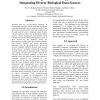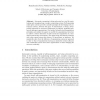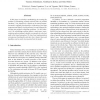789 search results - page 12 / 158 » Solving Complex Problems Efficiently with Adaptive Automata |
EOR
2008
13 years 7 months ago
2008
Primal-dual Interior-Point Methods (IPMs) have shown their ability in solving large classes of optimization problems efficiently. Feasible IPMs require a strictly feasible startin...
IJCAI
1989
13 years 8 months ago
1989
gn problem can be abstractly characterized as a constrained function-to-structure mapping. The de sign task takes as input the specifications of the desired functions of a device...
CSB
2005
IEEE
14 years 1 months ago
2005
IEEE
Scientists face an ever-increasing challenge in investigating biological systems with high throughput experimental methods such as mass spectrometry and gene arrays because of the...
ATAL
2008
Springer
13 years 9 months ago
2008
Springer
Abstract. Autonomic computing is being advocated as a tool for maintaining and managing large, complex computing systems. Self-organising multi-agent systems provide a suitable par...
IPPS
2003
IEEE
14 years 24 days ago
2003
IEEE
In this paper we develop a methodology for treating the problem of scheduling partially-ordered tasks on parallel machines. Our framework is based on the timed automaton model, or...



